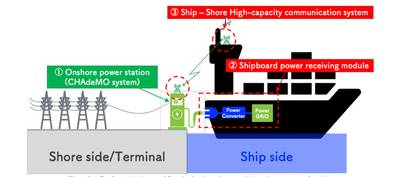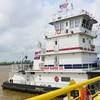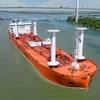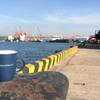Japanese Partners Aim to Promote Standardized Shore Power Systems
A group of Japanese organisations have claimed a world-first with their initiative to advance standardized, zero emission shore power systems.
Japanese ports and coastal industrial zones are responsible for about 60% of the country's CO2 emissions and are therefore a target for decarbonization, with Japan aiming to be carbon neutral by 2050. Shore power is attracting particular attention because approximately 40% of CO2 emissions in ports come from diesel generators on docked ships. These generators also cause a significant impact on the surrounding environment by emitting harmful substances such as NOx and SOx.
The organisations involved are: e5Lab, Marindows, e-Mobility Power, CHAdeMO Association, The Japan Ship Technology Research Association, Mitsubishi Ship Building, Development Bank of Japan. City of Kobe, Port and Harbor Bureau and City of Yokohama, Port and Harbor Bureau are participating in the initiative as observers.
They aim to develop and maintain a strategic ecosystem for zero emission chargers to develop user-friendly charging systems and attract more ships to use the service. Ultimately, this will realize zero emissions from ships in port areas, the spread of EV ships, the expansion of renewable energy use, and improvements in global and local environmental issues.
The system will consist of an onshore power station (standardized charger and billing system), a shipboard power receiving module (standardized and modularized hardware and software) and high-capacity communication between ship and shore (standardized high capacity communication system within the port).
For the first phase, by fiscal 2025, the partners will install prototype standardized universal zero emission chargers in Hanshin Port and Keihin Port. Both are international strategic ports where domestic and foreign freight and ships are concentrated.
They will then expand the chargers to other national and international ports.
















